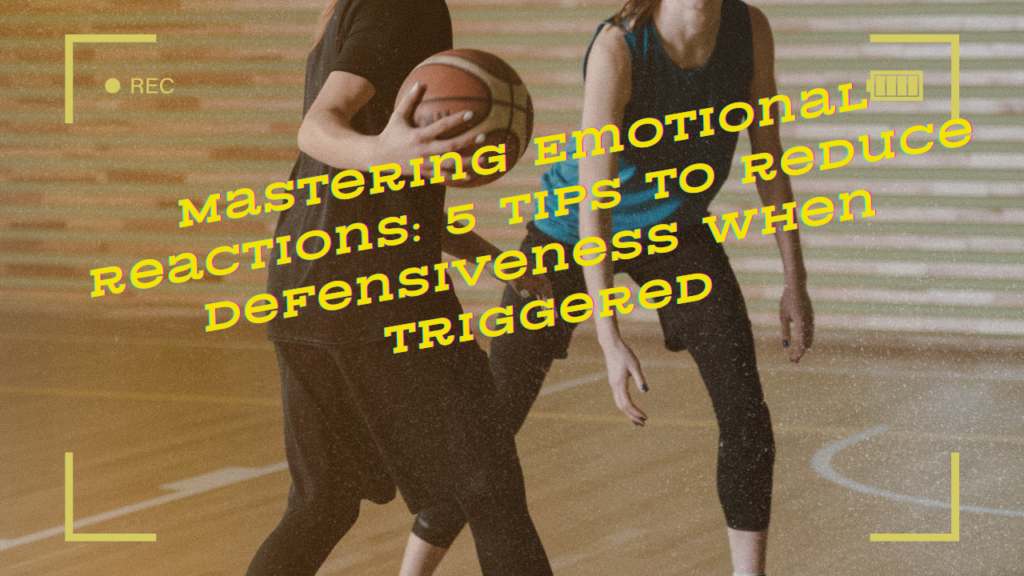Advertisement:
With over 25 years of experience as a business consultant, Abdul Vasi has helped countless brands grow and thrive. As a successful entrepreneur, tech expert, and published author, Abdul knows what it takes to succeed in today’s competitive market.
Whether you’re looking to refine your strategy, boost your brand, or drive real growth, Abdul provides tailored solutions to meet your unique needs.
Get started today and enjoy a 20% discount on your first package! Let’s work together to take your business to the next level!
Defensiveness is a natural reaction when we feel threatened, misunderstood, or criticized. However, reacting defensively can harm our relationships and impede personal growth. Learning how to respond more constructively when triggered can significantly improve your communication skills and emotional well-being. Here are five comprehensive tips on how to stop getting defensive when triggered.
1. Understand Your Triggers
The first step in reducing defensiveness is to understand what triggers it. Triggers are specific situations, words, or actions that provoke an emotional response. Identifying your triggers allows you to anticipate and manage your reactions more effectively.
Steps to Identify Your Triggers:
- Reflect on Past Experiences: Think about recent situations where you became defensive. What was said or done? How did you feel?
- Keep a Journal: Document instances when you feel defensive. Note the context, your thoughts, feelings, and reactions. Over time, patterns will emerge.
- Seek Feedback: Ask trusted friends, family, or colleagues for their perspective. They might notice triggers you haven’t identified.
- Consider Your Past: Sometimes, our triggers are rooted in past experiences or unresolved issues. Reflecting on these can provide insights into your current reactions.
Managing Your Triggers:
Once you identify your triggers, you can develop strategies to manage them. This might involve changing your environment, adjusting your expectations, or developing new coping mechanisms.
- Develop Awareness: Being aware of your triggers allows you to recognize them in the moment. When you feel yourself getting defensive, take a step back and acknowledge the trigger.
- Create a Response Plan: Have a plan for how you will respond when triggered. This might involve taking deep breaths, counting to ten, or excusing yourself from the situation temporarily.
- Practice Self-Compassion: Be kind to yourself when you’re triggered. Acknowledge that it’s a natural reaction and give yourself permission to feel your emotions without judgment.
2. Practice Active Listening
Defensiveness often arises from a misunderstanding or misinterpretation of what someone else is saying. Active listening involves fully focusing on the speaker, understanding their message, and responding thoughtfully. This helps to clarify misunderstandings and reduces the likelihood of a defensive reaction.
Components of Active Listening:
- Pay Full Attention: Give the speaker your undivided attention. Avoid distractions, make eye contact, and show that you’re engaged.
- Reflect and Paraphrase: Summarize what the speaker has said in your own words. This shows that you’re listening and provides an opportunity for clarification.
- Ask Open-Ended Questions: Encourage the speaker to elaborate on their points. This helps to deepen your understanding and shows that you’re interested.
- Show Empathy: Acknowledge the speaker’s feelings and perspectives. This helps to build rapport and reduces the likelihood of defensiveness.
Benefits of Active Listening:
- Improved Understanding: Active listening helps you to accurately understand the speaker’s message, reducing misunderstandings and conflicts.
- Stronger Relationships: By showing that you value and respect the speaker’s perspective, you can build trust and strengthen your relationships.
- Reduced Defensiveness: When you fully understand the speaker’s message, you’re less likely to misinterpret it as a personal attack.
3. Practice Mindfulness and Emotional Regulation
Mindfulness involves being present and fully engaged in the moment, without judgment. Practicing mindfulness can help you to recognize and manage your emotional responses, reducing the likelihood of a defensive reaction.
Steps to Practice Mindfulness:
- Mindful Breathing: Focus on your breath, observing each inhale and exhale. This helps to calm your mind and reduce emotional reactivity.
- Body Scan: Pay attention to physical sensations in your body, from your toes to your head. This helps you to stay grounded and present.
- Observe Your Thoughts: Notice your thoughts without getting caught up in them. Recognize that they are just thoughts, not facts.
- Practice Regularly: Incorporate mindfulness into your daily routine. Regular practice can help to improve your emotional regulation over time.
Emotional Regulation Techniques:
- Identify Your Emotions: Recognize and label your emotions as they arise. This helps to create a sense of distance and reduces the intensity of your reactions.
- Pause and Breathe: When you feel triggered, take a moment to pause and breathe deeply. This helps to calm your nervous system and gives you time to respond thoughtfully.
- Reframe Your Thoughts: Challenge negative or defensive thoughts by considering alternative perspectives. This can help to reduce the intensity of your emotional response.
- Practice Self-Soothing: Develop techniques to calm yourself when you’re feeling overwhelmed. This might include deep breathing, progressive muscle relaxation, or visualization exercises.
4. Develop Assertive Communication Skills
Assertive communication involves expressing your thoughts, feelings, and needs in a clear, direct, and respectful manner. By developing assertive communication skills, you can address issues constructively without resorting to defensiveness.
Components of Assertive Communication:
- Use “I” Statements: Focus on your own feelings and experiences rather than blaming or accusing others. For example, say “I feel upset when…” instead of “You always make me upset.”
- Be Clear and Specific: Clearly articulate your thoughts and needs. Avoid vague or ambiguous language.
- Stay Calm and Composed: Maintain a calm and respectful tone, even when discussing difficult topics. This helps to prevent the conversation from escalating.
- Listen Actively: Show that you value the other person’s perspective by listening actively and responding thoughtfully.
Benefits of Assertive Communication:
- Improved Relationships: Assertive communication fosters mutual respect and understanding, strengthening your relationships.
- Reduced Conflict: By addressing issues directly and respectfully, you can resolve conflicts more effectively.
- Increased Self-Esteem: Expressing your thoughts and needs assertively can boost your confidence and self-esteem.
Examples of Assertive Communication:
- Expressing Needs: “I need some time to think about this. Can we discuss it later?”
- Setting Boundaries: “I understand your point, but I’m not comfortable with that. Can we find another solution?”
- Providing Feedback: “I appreciate your efforts, but I feel that there are some areas we could improve.”
5. Seek Professional Support
If you find it challenging to manage your defensiveness on your own, seeking professional support can be beneficial. A therapist or counselor can help you to explore the underlying causes of your defensiveness, develop healthier coping strategies, and improve your communication skills.
Benefits of Professional Support:
- Personalized Guidance: A therapist can provide personalized guidance and support based on your unique needs and circumstances.
- Safe Space for Exploration: Therapy provides a safe and non-judgmental space to explore your thoughts, feelings, and behaviors.
- Skill Development: A therapist can help you to develop specific skills and strategies to manage your defensiveness more effectively.
Finding Professional Support:
- Research Therapists: Look for therapists who specialize in areas such as communication skills, emotional regulation, or relationship counseling.
- Seek Recommendations: Ask friends, family, or healthcare providers for recommendations.
- Consider Different Modalities: Explore different modalities such as individual therapy, group therapy, or online counseling to find the best fit for you.
Conclusion
Defensiveness is a natural reaction, but it can hinder personal growth and strain relationships. By understanding your triggers, practicing active listening, developing mindfulness, communicating assertively, and seeking professional support, you can reduce your defensiveness and respond more constructively when triggered. Implementing these strategies can lead to improved communication, stronger relationships, and greater emotional well-being.
Remember, change takes time and effort. Be patient with yourself and celebrate your progress along the way. With consistent practice and dedication, you can transform your defensive reactions into constructive responses, leading to a more fulfilling and harmonious life.




